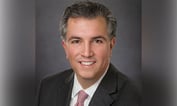Knowing how to engage folks to get them chatting, knowing when to shut up and listen, memorizing proven comebacks to trounce blow-offs. Tacks like these can’t turn dreaded cold calling into, well, the most fun ever; but they can turn dialing for dollars into winning more clients. (That is fun!)
In an interview with ThinkAdvisor, Mike Brooks, founder of Mr. Inside Sales and a former 12-year FA, discloses a number of his time-tested cold calling strategies and explains how advisors can overcome stumbling blocks to gaining trust that are part and parcel of cold calling.
An authority on phone selling and an expert phone script writer, consultant-trainer Brooks — whose motto is “Sales Solve Everything” – has a roster of financial services clients that include Raymond James and Charles Schwab. His newest book, “Power Phone Scripts: 500 Word-for-Word Questions, Phrases and Conversations to Open and Close More Sales” (Wiley – July 2017), is packed with best practice techniques that the author, who has sold via phone for more than 30 years, has developed.
(Related: Winning Scripts for Cold Calling)
In the interview, Brooks explains that scripted cold calls are the only way to go. Why? Because prospects raise the same objections again and again. Therefore, FAs need prepared responses to quickly quash resistance and qualify prospects, all the while, creating rapport.
Mr. Inside Sales’ success story is dramatic: As a cold calling rep at a pioneering California discount brokerage in the 1980s, Brooks was a bottom 80% producer, ad-libbing his way through calls and feeling frustrated. Eventually, he realized that using a structured script was the route to becoming a king closer.
He worked up a customized script and in 90 days became the No. 1 rep in his office of 25. Nine months later, he was No. 1 out of five branch offices. The following year, he was tapped as sales manager and by Christmas, had taught all the brokers to use his best practice scripted technique. He then went on to become sales vice president at two other independent BDs.
ThinkAdvisor recently interviewed Brooks, on the phone from Mr. Inside Sales’ North Carolina headquarters. This past April, the American Association of Inside Sales Professionals honored him with its 2017 service provider award for training and development. Here are highlights of our conversation:
THINKADVISOR: When someone answers the phone, is it cool to ask, “Is this a good time for you?”
MIKE BROOKS: That’s bad because you’re immediately giving the prospect a way out. They’re almost going to go, “Oh, yes, it is a bad time, and tomorrow will be bad, and the Twelfth of Never will be bad.” If it’s a bad time, they’ll tell you. Don’t lead with your chin and give them a way out. Instead, engage with them. Be personable, build some rapport. Ask qualifying questions. Be prepared.
What if it really is a bad time, and the prospect’s in a hurry or annoyed?
You need to listen to the mood and react accordingly — not steamroll over them. Give them space. That’s the fastest way to build trust because it’s an environment where you’re not assaulting them with a sales pitch.
Suppose they say, “I’m not interested”?
Be prepared in advance with a script and an approach that works. Personalize it, internalize it, memorize it. Say: “No problem at all. I’m not trying to sell you anything.” And put a little giggle in your voice. “I just have a quick question: How active have you been in the stock market in the last six months?” or “On a scale of one to 10, what’s your knowledge of managed accounts?”
What if they try to dismiss you with, “I have a financial advisor”?
Say: “That’s excellent. I’m glad you do. In fact, that’s exactly why I called you. I only like to work with people who are pretty savvy about the market.”
Why would that approach work?
Because you’re diffusing the objection. You’ve kind of sidestepped it. You haven’t pushed on that person. Instead, you’ve let the objection flow over you while you’re working around it. You aren’t going to meet them head-on because if you push on someone, they’re going to push back instinctively.
At what point do you try to get a prospect to start talking?
One of the mistakes many advisors make is that they’re not engaging quickly enough and allowing the prospect to speak. What happens is that their guard goes up, and they want to repel the rep. You have to ask a question quickly to see the level of interest and to qualify them.
What’s the best way to generate trust during a cold call?
The tenet I adhere to is that the reason top producers are so successful is that they recognize the golden rule of sales: 80% of the objections are the same. They recur over and over. The advisor should think, “I already know what the pushback and resistance statements will be, so I’d better doggone be prepared for them and not be thrown off my game.
What’s the second most important thing to promote trust in a cold call?
Listening. You don’t want to go, “Me, Me, Me. We, We, We. We specialize in [such and such].” A prospect [early on] doesn’t care about your specialty. It’s “I want you to care about me.” You build rapport by having a prepared opening; and as you talk, you listen for receptiveness. Ask questions to see if your specialty is even a fit and if it is, then you might see how you can weave it into the conversation to add value.
You write about one word that can boost sales. That word is…
“Today”: “I recommend that we go ahead and set an appointment today.” Or, if you’ve met with someone and you’re calling to close, say: “Let’s get you started and signed up today.”
What if the prospect says, “I’ll have to speak with my wife (or husband)”?
You’re going to identify the decision-makers in advance so that you’re not ambushed by that objection. If anybody gets that at the end of their close, they haven’t properly qualified. So at the start, you ask: “Besides yourself, who else would weigh in on these decisions?” If they say their spouse, say: “Terrific. When we get together, I’d love for [her/him] to be present so I can answer their questions.”
Any other way of overcoming, “I need to speak to my husband/wife”?
Isolate the objection because most of the time it’s a smoke screen hiding another objection. You simply say, “I totally understand.” That’s a softening statement. Then: “If you speak to your partner and they tell you to do whatever you think [is best], where would you be leaning, based on your understanding of what we’ve talked about?”
What else in dealing with the I-have-to-speak-to-my partner objection?
You could say, “Terrific idea. Why don’t you get [him/her] on the line. I’d be happy to answer any of their questions.” Twenty-five percent or 30% of the time, they’ll say, “Hang on. Let me see if they’re available.”
You write that there are three times to handle an objection. What are they?








 June 28, 2017 at 09:50 AM
June 28, 2017 at 09:50 AM










